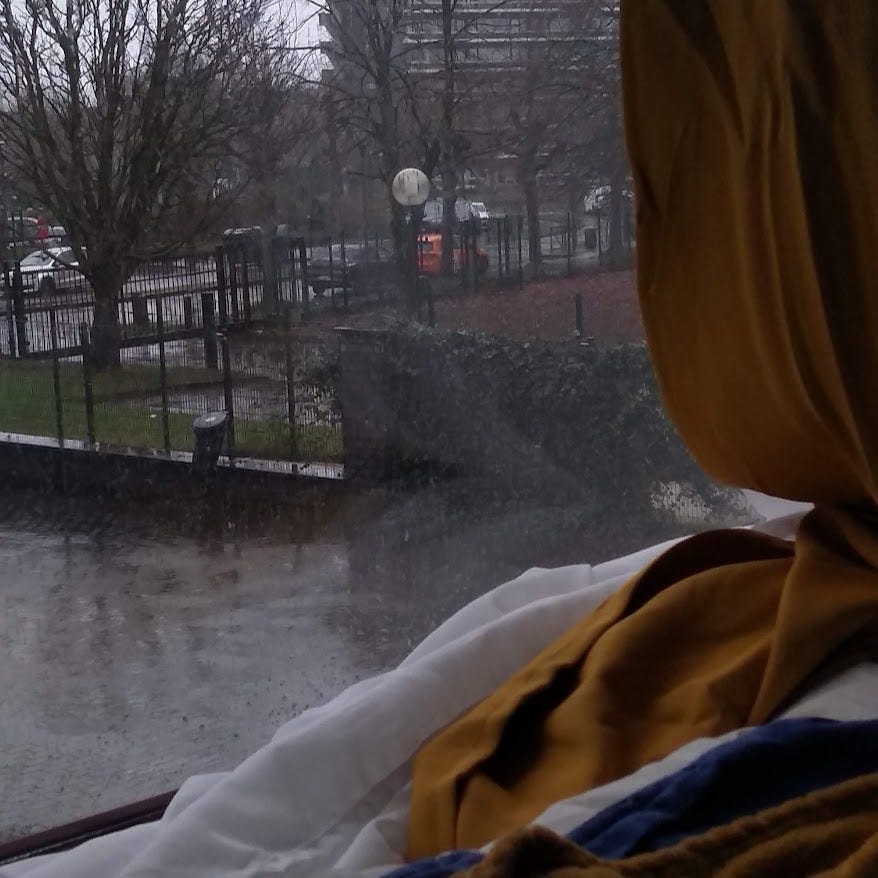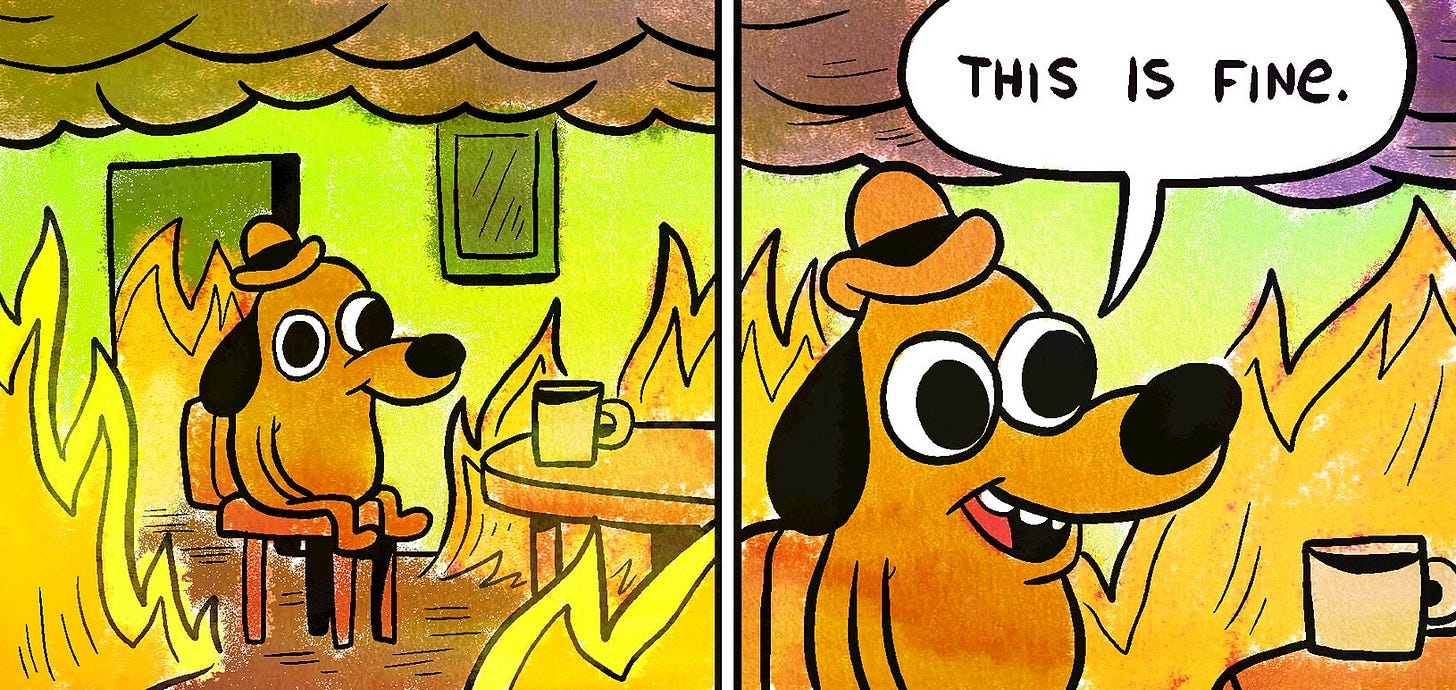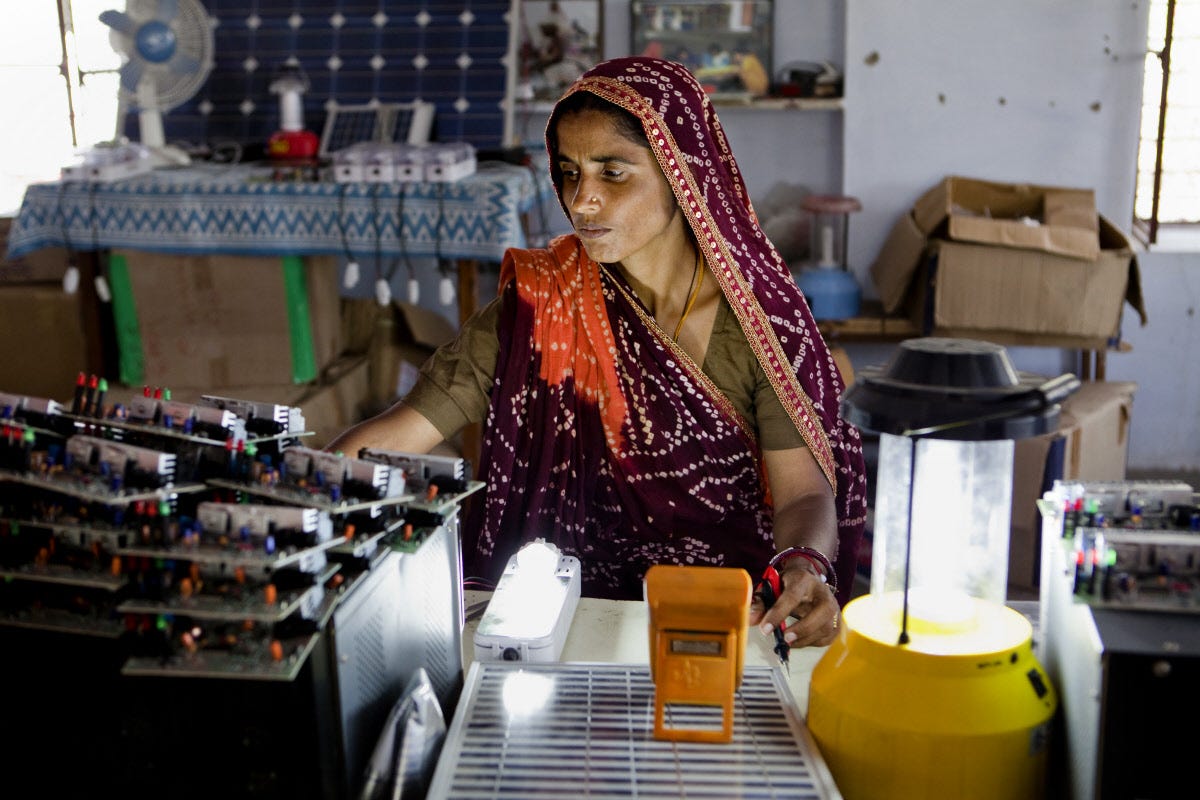Here's 5 ways the media can help the climate movement (rather than just terrifying us)
And a note for old and new subscribers on learning to live with uncertainty and climate anxiety.
Tell me, what is it you plan to do with your one wild and precious life?
Because I for one, have no idea.
Yes I watched Nyad on Netflix and that’s where I heard this poem. One of those sentences I roll my eyes at because I’m too Cool and Cynical to be won over by pretty quotes.
Except then I’m lying in bed or standing at a bus stop under TV-static Brussels clouds and I hear the line like an echo, a taunt, a tune I forgot I used to love. What is it you plan to do with your one wild and precious life?
Dear new flock of subscribers directed here from Politico and EU Insider, I hope you’re not coming here for concrete answers.
I started The Green Fix in 2021 because I believe it should be easier to understand what’s happening to the world around us - and how we can actually advocate for a better world. Our impact doesn’t begin and end at sorting the recycling and feeling that our efforts are akin to vacuuming a house that is currently on fire.
But it turns out you can’t write about climate injustice for 3 years without feeling slightly insane. The Green Fix has also become an outlet for recognising and talking about the heavy emotions that come with existing in tipping point times, and letting go of the need for certainty and control in an inherently uncertain world.
Eco-anxiety, climate grief and burnout are rife among young adults and those working on climate action: “I’m asked all the time how I cope with feelings of impending doom in my work as a climate scientist,” says
.Of course it’s hard. We exist in reaction and in relation to the things that happen around us in an interconnected ecosystem. What we do to the planet, we also do to ourselves.
Centuries of extractive economies leave a deep imprint on our social psyche.
talks about the perils of internalised capitalism. We conflate work with fulfilment. Even within climate advocacy, we try to Pomodoro-technique our way out of this mess. We see our friends less and work more. We set ourselves and our forests on fire. We burn out.Aspirations are good. But this feeling of constant urgency is not necessary nor will it quell the undercurrent of climate anxiety that seems to haunt everyone I know who is already working damn hard. Is this how we want to spend our days?
The longer I have worked in climate advocacy, the more I see how shifting away from extraction and colonialism into regenerative systems aligned with planetary needs is as much an internal process as it is a structural one.
Trees don’t grow according to deadlines. Our bodies tell us when it’s time to rest. Nature sets the pace. And our time is not there to be exploited and optimised. It’s there to be inhabited.
Tell me, what is it you plan to do with your one wild and precious life?
I don’t know. I don’t know many things. Personally I want to be OK with being here on this planet mainly as an observer. A passer-by, a future ancestor.

I wish I had some grand philosophical piece of wisdom here but the truth is I’m just a random Brussels-bubble climate activist and recovering perfectionist figuring out how to practise what I preach in terms of sustainable living, anticapitalism and unravelling this web of health, social and environmental crises.
So anyway. Welcome, old and new subscribers, to another year of climate news, opportunities to make a difference, and a tad bit of mental disarray.
I do know how to pay attention, how to fall down
into the grass, how to kneel in the grass,
how to be idled and blessed, how to stroll through the fields
which is what I have been doing all day.
Tell me, what else should I have done?
Doesn’t everything die at last, and too soon?
Tell me, what is it you plan to do
With your one wild and precious life?
—Mary Oliver
Tell us what you want! (Please, because we have no idea who you are)
To start the year, we’ve created a survey. It takes us about a working day to write an edition of The Green Fix so if you take 5 minutes to fill out the survey it will help dispel our (my) crippling fear that we’ve just spent a day writing something irrelevant.
Here’s the survey.
What’s Going On?
Emissions from Israel’s war in Gaza have ‘immense’ effect on climate catastrophe.
Related: Gaza is starving.Wealth of five richest men doubles since 2020 as five billion people made poorer.
Related: More than 250 billionaires call on world leaders to tax their wealth.EU bans ‘misleading’ environmental claims that rely on offsetting.
Related: Navigating misinformation: the raw truth about big meat.YouTube is spreading climate misinformation and climate deniers.
Related: How fossil fuels found their influencers.Azerbaijan appoints no women to 28-member Cop29 climate committee (update: after backlash, they have).
Related: Behind a landmark lawsuit case against Shell.
Consider tipping us a virtual coffee.
Focus On… Our 2024 climate media wishlist
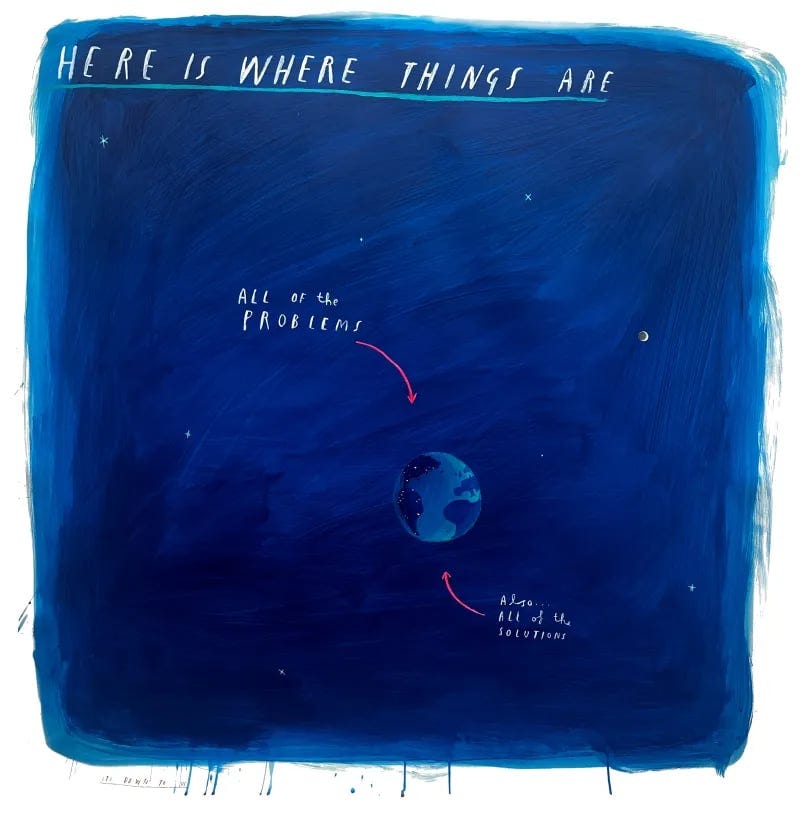
As we (slowly) organise the content for the year ahead, we’ve rounded up some things that we want to see more of in the media coverage around the climate crisis this year.
Making the climate connections
Historically, media outlets have segmented environmental and climate news as its own category. But extreme weather and climate disasters are affecting, and being affected by, every other sector. Business, politics, housing, health, food, jobs - all of these sectors are being shaped by the unfolding climate crisis.
From record heatwaves every summer, to the erosion of democracy, to the rising cost of living - we want to see the media explicitly drawing the connections. The record heatwaves are not freak events. We can’t effectively understand what’s happening without looking at the broader picture.
Covering Climate Now has an amazing guide to covering the climate across beats.
Recognise the role of capitalism in driving the climate crisis
Linked to covering climate across beats, climate science has made it clear that the narrow-minded pursuit of GDP growth is not serving us or the planet.
“GDP is often equated with levels of social welfare, even though as a measure of market output, it can be an inadequate metric for gauging well-being over time, particularly in its environmental and social dimensions.” The IPCC report AR6 (Feb 2022)
Much media attention is taken up by false solutions and temporary fixes while failing to address or label the root cause. We wouldn’t have to invest millions in carbon offsetting, carbon capture and storage systems (which, by the way, are largely ineffective against the scale of emissions we’re dealing with) or worry about the impact of a thousand disposable straws if we didn’t have an economic system that makes unsustainable production profitable.

And even less reported is the fact that alternative economic systems are possible and already exist. The IPCC mentions degrowth and ways of living that are based on parameters other than economic growth several times in its recommendations for transformational change.
Spotlight the Global North’s contribution to the climate crisis
The climate crisis has a disproportionate impact on people and communities in the Global South, experiencing both the worst weather extremes and having fewer resources to deal with them.
The poorest half of the world’s population - 3.5 billion people - is responsible for just 10 percent of carbon emissions. The wealthy communities in the Global North are contributing the vast majority of emissions and it is the poorest and most climate-vulnerable countries and communities paying the price.
Despite this rampant inequality, rich countries have not followed through on multiple international commitments to provide funding for climate adaptation and loss and damage. Oxfam estimates that rich countries owe around 13 trillion USD by now.
We want the media to recognise this staggering debt, and the responsibility of historically high-emitting countries to pay up for their impacts and search for climate solutions that don’t just replicate the inequalities of the past.
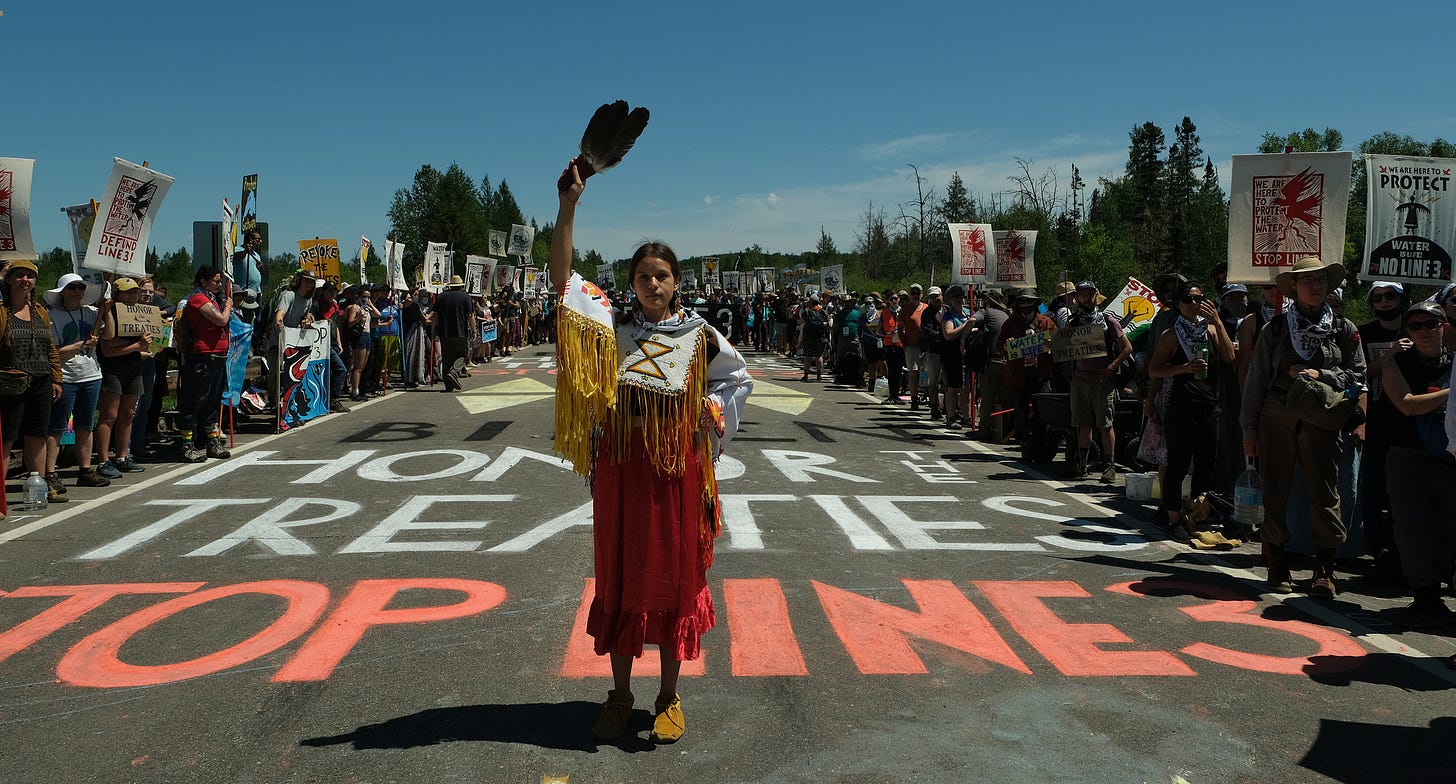
The majority of the world’s population is underrepresented in the media. That’s wild. People from the Global South, indigenous communities, women and non-binary people, low-income communities, young people, neurodiverse people - we need all of these and more for meaningful climate solutions and perspectives, and to shift away from the colonial, petro-capitalist and patriarchal narratives that have dominated mainstream media.
Here’s a great checklist from Reporting in Indigenous Communities.
Follow the money (who’s really making decisions here?)
Fossil fuel companies, industrial agriculture lobby groups and high-emitting sectors of the population continue to have a chokehold influence over politics, economics and the media.
Even the ‘most trusted’ media outlets including Bloomberg, The Economist, the Financial Times, the New York Times, Politico, Reuters, and the Washington Post have accepted sponsorship from fossil fuel companies to promote oil and gas content through adverts.
These polluting industries are also paying to spread climate misinformation, climate denial, change the content of university degrees to favour oil and gas, and to disproportionately influence the outcomes of international climate conferences. They also undermine government policies designed to protect people from energy poverty and hold an average of one meeting a week with major EU policymakers.
This year we want more transparency from the media and governments on where the money is flowing from, and who exactly is writing the headlines.
Climate solutions
Amidst all the climate disaster news, there’s plenty of space to point out the abundance of solutions and people making a difference.
“Solutions stories can change the tone of public discourse, making it less divisive and more constructive. By revealing what has worked, such stories have led to meaningful change.” The Solutions Journalism Network.
Solutions are the other side of the story to the problem. We need to know how bad it is, yes, but also what is being done - to learn from the mistakes, collaborate and replicate successes.
The underreporting on climate solutions is connected to the other gaps in media coverage. How will we learn from indigenous communities on how to protect biodiversity better if we never hear from the people who do it best? How can we best tackle gender inequality in climate action without women in the byline? Where will we make the space for climate solutions if that space is taken by fossil fuel funded adverts?
They say ‘if it bleeds, it leads.’ But climate negativity is actually putting people off reading the news altogether. More news about what is working to sustain life on this planet, to make a better future, to save our descendants, to keep hope alive - is what we both want and need.
Here’s what you said on Instagram about what you’d like to see more of in the news:
More answers via DM included: growth critique and post-growth; rebound effect; how lobbies are working against EU climate policies; the issues with green hydrogen.
So Now What Do I Do?
LEARN
Read: On beginning things (slowly) by
.Read: How to stop hurrying.
Listen: What if we could reclaim the internet as a force for good?
TRY SOMETHING NEW
Aged 18-30 and artsy? Check out this series of webinars on how to become a climate artivist. Runs January - April.
Tune into this free online event: How can I help expose greenwashing? on the 1st February at 17:00 CET.
Young people 16-23 interested in civil society can apply to join the May Actival Festival in Germany! Deadline to apply 4th Feb [€25 participation fee].
CHANGE THE SYSTEM
The 100x Impact Accelerator is looking for purpose-driven leaders hoping to scale up their impact. Deadline 29th January.
The 3-month virtual New Futures Fellowship is looking for activists and academics to work on interdisciplinary climate solutions. Deadline 31st January.
The impressively-named Gulbenkian Prize for Humanity is accepting nominations for outstanding contributions to climate action. Deadline 2nd February.
By the way…
The Green Fix offers low-cost sponsored slots on the newsletter. Find out the options by emailing wearethegreenfix@gmail.com.
Stay in the loop
The Green Fix is on Twitter @TheGreenFix, Instagram @thegreenfix_ and LinkedIn. Cass Hebron (Editor) is on Instagram @coffee_and_casstaways and LinkedIn Cass J Hebron.





